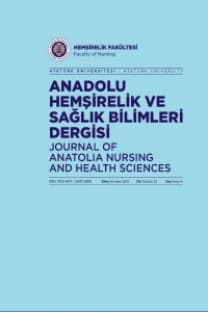YENİDOĞAN YOĞUN BAKIM ÜNİTELERİNDE YATAN BEBEKLERİN EBEVEYNLERİNİN RAHATLIK DÜZEYİ
Rahatlama, ebeveynlik, yenidoğan yoğun bakım üniteleri, hemşirelik
___
Akşit S, Cimete G. Çocuğun Yoğun Bakım Ünitesine Kabulünde, Annelere Uygulanan Hemşirelik Bakımının Annelerin Anksiyete Düzeyine Etkisi. Cumhuriyet Hem. Der 2001;5(2):25-36.Bialoskurski MM, Cox CL, Wiggins R.D. The Relationship Between Maternal Needs and Priorities in a Neonatal Intensive Care Environment. J Adv Nurs 2002; 37(1):62-9.
Connie W, Cobiella P, Mabe A, Forehand RL. A Comparison of Two Stres-Reduction Treatments for Mothers of Neonates Hospitalized in a Neonatal Intensive Care Unit. Child Health Care 1990;19(2):93-100.
Çalışır H, ġeker S, Güler F, Taşçıoğlu G, Türkmen M. Yenidoğan Yoğun Bakım Ünitesinde Bebeği Yatan Ebeveynlerin Gereksinimleri ve Kaygı Düzeyleri. Cumhuriyet Hem. Der 2008;12(1):31-44.
Davis LL. Instrument Review: Getting the Most from a Panel of Experts. Appl Nurs Res 1992; 5(4):194-7.
Erdeve Ö, Atasay B, Arsan S, Türmen T. Yenidoğan Yoğun Bakım Ünitesinde Yatış Deneyiminin Aile ve Prematüre Bebek Üzerine Etkileri. Çocuk Sağ Hast Derg 2008; 51(2):104-9.
Franck LS, Cox S, Allen A, Winter I. Measuring Neonatal Intensive Care Unit-Related Parental Stres. J Adv Nurs 2005;49(6):608–15.
Fowlie WP, Mchaffie H. Supporting Parents in the Neonatal Unit. BMJ 2004; 329(7478):1336-8.
Huckabay LMD. The Effect on Bonding Behaviour of Giving a Mother her Premature Baby’s Picture: Scholarly Inquiry for Nursing Practice. Sch Inq Nurs Pract 1987;1(2):115-29.
Kolcaba K. Holistic Comfort: Operationalizing the Construct as a Nurse-Sensitive Outcome. ANS Adv Nurs Sci 1992;15(1):1-10.
Pınar G, Doğan N, Algıer L, Kaya N, Çakmak F. Annelerin Doğum Sonu Konforunu Etkileyen Faktörler. Dicle Tıp Derg 2009;36(3):184-90.
Kolcaba K. A Vision for Holistic Healt Care and Research. In: Chasek R, Hurkin J, eds. Comfort Theory and Practice. 1 st ed. New York: Springer Publishing Company; 2003.p.6-43.
Kolcaba K, Dımarco M A. Comfort Theory and Its Application to Pediatric Nursing. Pediatr Nurs 2005;31(3):187-94.
Kuğuoğlu S, Karabacak Ü. Genel Konfor Ölçeğinin Türkçe’ye Uyarlanması. İ. Ü. F. N. Hem. Derg 2008;61(16):16-23.
Lan SF, Mu PF, Hsıeh KS. Maternal Experiences Making a Decision About Heart Surgery for Their Young Children with Congenital Heart Disease. J Clin Nurs 2007;16(12):2323–30.
Mok E, Leung SF. Nurses as Providers of Support for Mothers of Premature Infants. J Clin Nurs 2006;15(6):726-34.
Molınowoski A, Stamler LL. Comfort Exploration of the Concept in Nursing. J Adv Nurs 2002;39(6):599-606.
Oflaz F. Hasta Çocuk ve Ebeveynlerinin Pediatrik yoğun bakım deneyimi ve travmatik stres. Cumhuriyet Hem. Der 2008;12(1):53-9.
Ortenstrand A, Winbladh B, Nordstrom G, Waldenstrom U. Early Discharge of Preterm Infants Followed by Domiciliary Nursing Care: Parents’ Anxiety, Assessment of Infant Health and Breastfeeding. Acta Paediatr 2001;90(10):1190-5.
Rehm RS, Bradley JF. The Search for Social Safety and Comfort in Families Raising Children with Complex Chronic Conditions. J Fam Nurs 2005;11(1):59-78.
Turan T, Bolışık B. Prematüre Bebeği Olan Ailelere Serviste Uygulanan Planlı Eğitimin Anne ve Bebek Üzerine Olan Etkilerinin İncelenmesi. Cumhuriyet Hem. Der 2003;7(1):39-46.
Veneziano L, Hooper J. A Method for Quantifying Content Validity of Health-related Questionnaires. Am J Health Behav 1997; 21(1):67-70.
- ISSN: 1309-5471
- Yayın Aralığı: Yılda 4 Sayı
- Yayıncı: Atatürk Üniversitesi Hemşirelik Fakültesi
ENTEGRE PROGRAM HEMŞİRELİK ÖĞRENCİLERİNİN KLİNİK STRES DÜZEYİ VE ETKİLEYEN FAKTÖRLER
Dilek ÖZDEN, Şerife KARAGÖZOĞLU, Fatma TOK YILDIZ
YENİDOĞAN YOĞUN BAKIM ÜNİTELERİNDE YATAN BEBEKLERİN EBEVEYNLERİNİN RAHATLIK DÜZEYİ
TÜRKİYE’DE KURAM/MODELE DAYALI HEMŞİRELİK ARAŞTIRMALARININ İNCELEMESİ
Figen ŞENGÜN, Besti ÜSTÜN, Kerime BADEMLİ
Enteral beslenme: Bakımda güncel yaklaşımlar
Özelleştirme: Sağlıkta özelleştirme ve hemşireler
Arzu Kader SEREN HARMANCI, Aytolan YILDIRIM
Yenidoğan yoğun bakım ünitelerinde yatan bebeklerin ebeveynlerinin rahatlık düzeyi
Prenatal bağlanma envanterinin Türkçe’ye uyarlanması: Güvenilirlik ve geçerlilik çalışması
Nezihe Kızılkaya BEJİ, Sema Dereli YILMAZ
DOĞUM EYLEMİNDE GEBELERİN ANKSİYETE DÜZEYLERİNİN İNCELENMESİ
Zehra ÜST, Türkan PASİNLİOĞLU, Hava ÖZKAN
ENTERAL BESLENME: BAKIMDA GÜNCEL YAKLAŞIMLAR
PRENATAL BAĞLANMA ENVANTERİ’NİN TÜRKÇE’YE UYARLANMASI: GÜVENİLİRLİK VE GEÇERLİLİK ÇALIŞMASI
